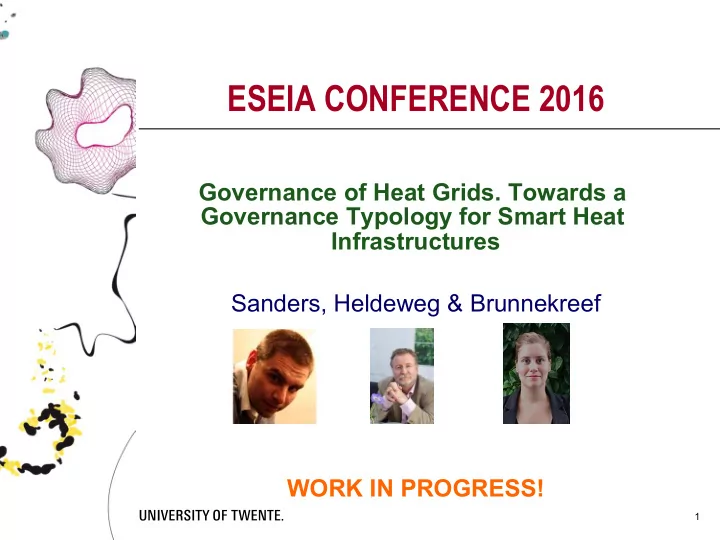

ESEIA CONFERENCE 2016 Governance of Heat Grids. Towards a Governance Typology for Smart Heat Infrastructures Sanders, Heldeweg & Brunnekreef WORK IN PROGRESS! 1
1. ENERGY GOVERNANCE Towards a Competitive Low-Carbon European Economy in 2050 (EC, 2011: 20) The Netherlands is one of the most Fossil Fuel-based and CO 2 intensive Economies of the world (IEA, 2014) Renewable Energy is seen as important element in improving Dutch performance: Energy Transition Energy from Residual Heat is seen as a potential Market next to that of Gas and Electricity 2
2. HEAT ENERGY MARKET Local or Regional Grids or Infrastructures as Markets New Technologies Input è Throughput è Output Supplier(s?) è Grid Manager(s?) è User(s?) Markets! 3
3. ENERGY (MARKETS) GOVERNANCE New Technology in Renewable Energy Calls for fitting Governance (Sanders & Hoppe, 2015; Lodge & Wegrich, 2014) ‘Call’ also applicable to Development of Heat Grids / Infrastructures 4
3. ENERGY (MARKETS) GOVERNANCE A Well-Considered Governance Approach is needed to Prevent / Remedy Barriers that may lead to Decision Deadlocks & Non-realisation of Heat Grids. What Governance of Decision-making fosters (proper Orchestration for) Establishing Heat Grids / Infrastructures? 5
3. ENERGY (MARKETS) GOVERNANCE A Well-Considered Governance Approach is needed Versus Decision Deadlocks & Non-realisation of Grids. Regional projects in the Netherlands Grids & Connecting Grids (Infrastructures) Arnhem-Nijmegen – open (growth) model Provincial ambition: in 2030 pipeline for 90,000 user connections Hengelo-Enschede – open (growth) model Provincial ambition: 17,500 homes & 800 businesses … and more Amsterdam/Metropolitan … .. The Hague Region 6
4. TOWARDS A GOVERNANCE TYPOLOGY FOR HEAT GRIDS Assumption: Heat Market is largely unregulated – no Ex Ante Structured Relation between relevant Stakeholders Est. Grid as Collective Action: (Non-Hierarchic) Orchestration Bottom-Up Governance Typology (& Orchestration of Collective Action) following 2 Characteristics of Grids / Infrastructures: • Regulatory nature of the grid regime esp. public ó private interest-driven • Technical complexity of grid functionality esp. low/closed ó high/open 7
4. TOWARDS A GOVERNANCE TYPOLOGY FOR HEAT GRIDS Bottom-up Governance Typology following 2 Characteristics of Grids / Infrastructures 8
4. TOWARDS A GOVERNANCE TYPOLOGY FOR HEAT GRIDS Reasoning from Operational Ambition to Collective Choice Governance: Consider Levels of Analysis & Design 9
5. OPERATIONAL LEVEL PROJECTED GRID TYPE ‘Bottom-Up’ Orchestration Optimality: Reason from Ideal Type Picture of Operational Grid Ambition Acknowledge hybridity … ... Reason from 4 Types of Orchestration 10
5. COLLECTIVE CHOICE LEVEL DECISION MAKING Following an Operational Level Ideal Type Grid 11
5. COLLECTIVE CHOICE LEVEL DECISION MAKING As before slide; including Hybrid Governance Space 12
6. CONSTITUTIONAL LEVEL INSTITUTIONAL ENVIRONMENTS Considering ‘Top-Down’ Prescriptive Influences: Institutional Environments as Legal Institutions Descriptive and Prescriptive Pattern of Behavior Institutional Environments Ph - Public Hierarchy ê H1. Regulated Market é Cm - Competitive market 13
6. CONSTITUTIONAL LEVEL INSTITUTIONAL ENVIRONMENTS 1. Dutch Heat Act projects a Regulated Heat Market Contracting constraints (tariffs, shuttng-off, complaints) Permits for larger grids/infrastructures ( ≥ 10 u. & ≥ 10K GJ/an) 2. Dutch Heat Vision ( è Δ Heat Act; Δ Orchestration Reg.Market) Emancipate Heat Market ó Gas (& Electricity) - terminate legally obligatory gas connection - favor open/complex over closed/simple grids user choice between heat suppliers - favor public ‘over’ private lead local heat planning + oblig. heat connection; national subsidies.. Possibly private obligation to allow 3 rd party suppliers access) 14
8. CONCLUSION ‘Bottom-Up’ (Operational è Coll. Choice) > from ‘desired ideal type grid’ < ‘Top-Down’ (Constitutional è Coll. Choice) > from ‘prescribed Inst. Environment’ < 15
FIN 16
Recommend
More recommend